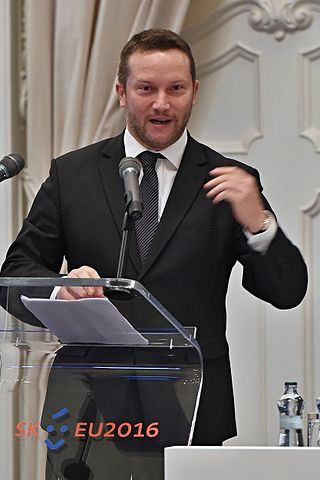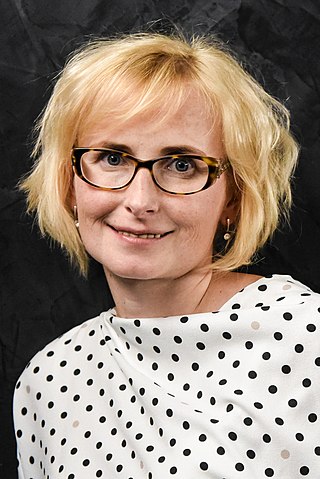Related Research Articles
Father of the House is a title that has been traditionally bestowed, unofficially, on certain members of some legislatures, most notably the House of Commons in the United Kingdom. In some legislatures the title refers to the longest continuously serving member, while in others it refers to the oldest member. Recently, the title Mother of the House or Mother of Parliament has also been used, although the usage varies among countries; it is either the female alternative to Father of the House, being applied when the relevant member is a woman, or refers to the oldest or longest-serving woman without reference to male members.

The president of the Czech Republic, officially the President of the Republic, is the head of state of the Czech Republic and the commander-in-chief of the Armed Forces of the Czech Republic.

The SNK European Democrats is a political party in the Czech Republic, led by Zdeňka Marková. The first regular chairperson of this party was Jana Hybášková. The party was created in January 2006 by the merger of two Czech non-parliamentary political parties – SNK Union of Independents, led by the former Foreign Minister Josef Zieleniec, and the European Democrats, led by Jan Kasl, the former Mayor of Prague.

Romania elects on a national level a head of state – the president – and a legislature. The president is elected for a five-year term by the people. The Romanian Parliament has two chambers. The Chamber of Deputies has currently 330 members, elected for a four-year term by party-list proportional representation on closed lists. The Senate has currently 136 members, elected for a four-year term by party-list proportional representation on closed lists.

All elections in the Czech Republic are based on the principle of universal suffrage. Any adult citizen who is at least 18 years old can vote, except those who have been stripped of their legal capacities by a court, usually on the basis of mental illness. Elected representatives are elected directly by the citizens without any intermediaries. Election laws are not part of the constitution, but – unlike regular laws – they cannot be changed without the consensus of both houses of the Parliament. The Czech Republic uses a two-round plurality voting system for the presidential and Senate elections and an open party-list proportional representation system for all other elections. The proportional representation system uses the Sainte-Laguë method for allocating seats.

The Model European Parliament (MEP) is an international simulation of the working of the European Parliament for students aged 16–19. The aim of the programme is to give young people an insight into the workings of the European Parliament and raise their awareness of European citizenship. Two sessions are held each year, each involving 180 secondary school students.

Libor Rouček is a Czech politician who was Member of the European Parliament from 2004 to 2014 with the Czech Social Democratic Party. He was a former member of the Chamber of Deputies of the Czech Republic from 2002 to 2004 and Spokesperson for the Government of the Czech Republic from 1998 to 2002.

The Parliament of Albania or Kuvendi is the unicameral representative body of the citizens of the Republic of Albania; it is Albania's legislature. The Parliament is composed of no less than 140 members elected to a four-year term on the basis of direct, universal, periodic and equal suffrage by secret ballot. The Parliament is presided over by the Speaker, who is assisted by at least one deputy speaker. The electoral system is based on party-list proportional representation. There are 12 multi-seat constituencies, corresponding to the country's counties.
A dual mandate is the practice in which elected officials serve in more than one elected or other public position simultaneously. This practice is sometimes known as double jobbing in Britain and cumul des mandats in France. Thus, if someone who is already mayor of a town or city councillor becomes elected as MP or senator at the national or state legislature and retains both positions, this is a dual mandate.

Serafim Urechean is a Moldovan politician. He held the position of general mayor of Chișinău municipality (1994–2005) and interim prime minister of the Republic of Moldova. He was the chairman of the party Our Moldova Alliance (2003–2011), first deputy chairman of the Parliament of the Republic of Moldova (2009–2010) and president of the Court of Accounts of the Republic of Moldova (2011–2016).

Dr. István Ujhelyi is a Hungarian politician from the Hungarian Socialist Party, who was MP in the National Assembly of Hungary between 2002 and 2014. He served as a Member of the European Parliament (MEP) from 2014 to 2024.

Indirect presidential elections were held in the Czech Republic in January and February 2003 to elect a new President. The Parliament of the Czech Republic failed to elect a candidate on the first two ballots on the 15 and 24 January. However, on the third round of the third ballot on 28 February, Václav Klaus was elected.

Kateřina Konečná is a Czech politician, who has been a Member of the European Parliament representing the Czech Republic since 2013. Since 23 October 2021 she has been the leader of the Communist Party of Bohemia and Moravia (KSČM).
Veroljub Arsić is a politician in Serbia. He has served in the National Assembly of Serbia since 2001, originally as a member of the Serbian Radical Party and since 2008 as a member of the Serbian Progressive Party.
Mladen Grujić is a politician and entrepreneur in Serbia. He has served in the National Assembly of Serbia since 2007, originally as a member of New Serbia and since January 2017 as an independent. He was a member of the Assembly of Serbia and Montenegro from 2004 to 2006. Grujić serves on the executive board of the Inter-Parliamentary Union.
Enis Imamović is a Serbian politician from the country's Bosniak community. He served in the National Assembly of Serbia from 2012 to 2024. Imamović was a leading member of the Party of Democratic Action of Sandžak (SDA) for many years until leaving the party in late 2023.

Dragan Jovanović is a Serbian politician who was the mayor of Topola from 2004 to 2014 and is now serving his fifth term in Serbia's national assembly. A prominent member of New Serbia (NS) for many years, he founded Better Serbia (BS) in 2017 and was its leader until 2023, when it merged into the Serbian Progressive Party (SNS).
Petr Ježek is a former Czech politician and diplomat. He was a Member of the European Parliament (MEP) from 2014 to 2019, representing ANO 2011. While an MEP, he chaired a Parliamentary Committee and an External Delegation, and was ranked as the 20th most influential MEP of 751 by the Vote Watch Europe analyst group.
Vjerica Radeta is a Serbian politician. She is a prominent figure in the far-right Serbian Radical Party (SRS) and has served several terms in the National Assembly of Serbia.
Aleksandra Tomić is a Serbian politician. She was a member of Serbia's national assembly from 2012 to 2024 and held several leading positions in the assembly's oversight of finance and the economy. Tomić is a member of the Serbian Progressive Party (SNS).
References
- ↑ "Home | MEPs | European Parliament". www.europarl.europa.eu. Retrieved 2022-09-16.